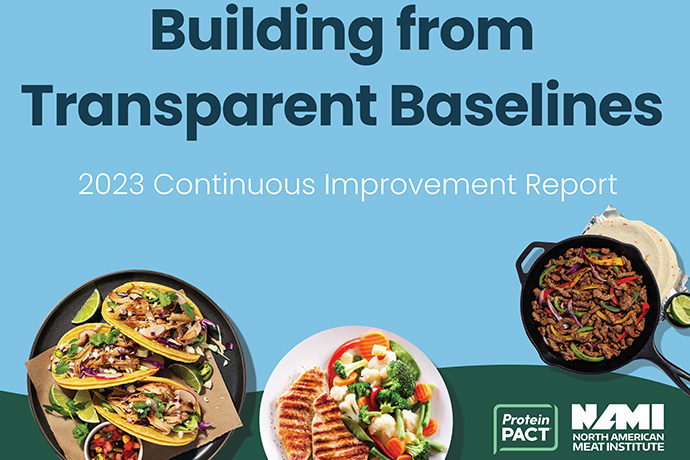WASHINGTON — The North American Meat Institute (NAMI) released its second annual Continuous Improvement Report, which represents data from over half of all establishments operated by NAMI members. The group celebrated the growth of participating processors by nearly 60% this year, as 87 total companies reported data.
“We’ve spent the last three years building the framework,” said NAMI president and chief executive officer Julie Anna Potts in the report. “We now look forward to demonstrating over the coming years that the Protein PACT works as a vehicle for long-term continuous improvement — because it’s the right thing to do and because earning consumers’ trust demands nothing less.”
The Protein PACT for the People, Animals and Climate of Tomorrow formed in July 2021 to accelerate the industry’s momentum and track quantifiable progress toward global sustainability goals.
The latest improvement report shows commitments covering an estimated 90% of meat sold in the United States. NAMI looks to have 100% of its members declare a science-based emissions reduction target by 2030.
“Ninety-eight percent of American households purchase meat, putting our sector undoubtedly at the center of sustaining healthy diets, healthy communities and a healthy planet for generations to come,” Potts said. “The Meat Institute has a clear vision for 2030 and has established measurable targets to verify progress along the way, including through this game-changing data collection and reporting which will incentivize sector-wide implementation of best practices and allow us to identify gaps where further resources are needed to achieve ambitious goals.”
In addition to having all members set emissions targets, NAMI named four other key focus areas for continuous improvement:
- By 2025, all NAMI members who handle animals will pass third-party animal transport and handling audits, and all members will require all suppliers to implement mandatory employee training and follow species-specific standards for animal care.
- By 2025, NAMI will measure and help fill the protein gap to ensure families in need have enough high-quality protein by working with the US Department of Agriculture and Feeding America.
- By 2030, NAMI will further reduce workplace injuries by 50% (2019 baseline), on top of the 75% reduction achieved from 1999 to 2019.
- By 2030, 100% of NAMI members will be reporting on all metrics.
Currently, of the establishments reporting data, 66% are covered by a company commitment to set scope 1 and 2 emissions reduction goals; 62% are covered by a company commitment to set scope 3 emissions reduction goals.
The report further detailed companies’ commitments related to healthy land, air and water; animal care; worker safety and diversity; food safety; and nutrition.
NAMI members include over 350 meat processing companies, the majority of which have fewer than 100 employees, and account for over 95% of the nation’s output of meat and 70% of turkey production.
Last month, NAMI — in collaboration with the United Nations Global Compact Network USA — introduced a new tool to aid the meat industry in measuring greenhouse gas emissions. The tool uses real-life data methodologies and anonymized company information to measure an organization’s direct, indirect and value chain emissions, including scope 1, 2 and 3.


